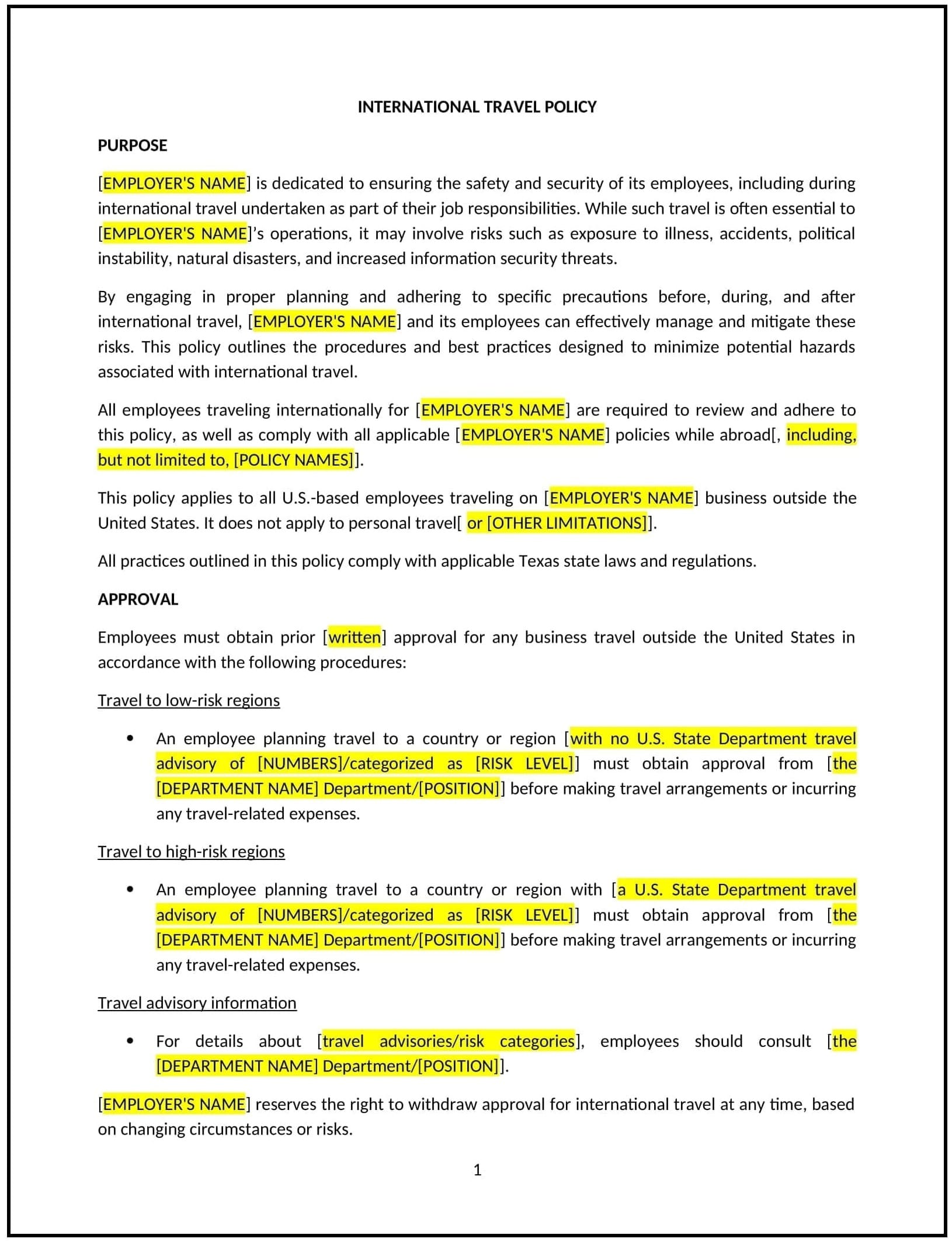Got contracts to review? While you're here for policies, let Cobrief make contract review effortless—start your free review now.

Customize this template for free
International travel policy (Texas)
This international travel policy is designed to help Texas businesses establish clear guidelines for employees traveling abroad for work purposes. The policy outlines the procedures for booking travel, managing expenses, ensuring safety and security, and complying with relevant legal and regulatory requirements.
By adopting this policy, businesses can help ensure that international travel is managed efficiently, safely, and in compliance with Texas state laws, federal regulations, and company standards.
How to use this international travel policy (Texas)
- Define eligible travel: Specify the circumstances under which international travel is authorized, such as for business meetings, conferences, client visits, or company events.
- Set approval processes: Outline the approval process for international travel requests, including who must approve travel and any documentation that needs to be submitted (e.g., travel itinerary, business purpose, estimated costs).
- Address travel bookings: Provide guidelines for booking flights, accommodations, and other travel arrangements, including preferred travel agencies, booking platforms, and class of service based on the employee’s role or purpose of travel.
- Define expense reimbursement: Specify the process for reimbursing employees for international travel expenses, including travel, meals, lodging, transportation, and incidentals. Set daily per diem rates and specify any limits or exclusions for reimbursement.
- Ensure safety and security: Establish procedures for ensuring employee safety while traveling, including providing emergency contact information, travel insurance, and guidance on health and security risks specific to the destination.
- Comply with regulations: Ensure that employees comply with relevant laws, including visa requirements, customs regulations, and health regulations in the destination country. Specify any documentation or vaccinations required prior to travel.
- Set expectations for conduct: Define expectations for employee behavior while traveling, including professional conduct, adherence to company policies, and respectful interactions with clients, colleagues, and locals.
Benefits of using this international travel policy (Texas)
This policy offers several benefits for Texas businesses:
- Promotes efficient and organized travel: By setting clear guidelines and approval processes, businesses can streamline the logistics of international travel, ensuring that trips are well-planned and cost-effective.
- Ensures employee safety: A strong safety protocol ensures that employees are informed of risks and prepared for travel, reducing the likelihood of incidents and emergencies while abroad.
- Complies with legal requirements: The policy helps businesses comply with visa regulations, customs rules, and international labor laws, reducing the risk of legal issues or penalties.
- Improves cost management: By establishing guidelines for expenses and reimbursements, businesses can control costs and ensure that travel-related spending stays within budget.
- Enhances employee productivity: With clear travel guidelines and support, employees can focus on the business purpose of their travel, increasing overall productivity and success during trips.
Tips for using this international travel policy (Texas)
- Communicate the policy clearly: Ensure that all employees who may travel internationally are aware of the policy, the approval process, and any specific travel procedures they must follow.
- Provide travel support: Offer employees access to resources such as travel agents, emergency contacts, or travel insurance to ensure that their trips are well-supported.
- Ensure pre-trip preparation: Ensure that employees complete all necessary steps before traveling, such as obtaining visas, receiving vaccinations, and confirming insurance coverage.
- Monitor travel expenses: Regularly review and monitor international travel expenses to ensure compliance with the policy and identify opportunities to reduce costs.
- Review regularly: Update the policy as necessary to reflect changes in Texas state laws, federal regulations, company practices, or emerging travel risks.